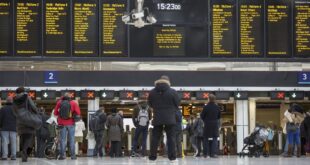Teachers in England and Wales are set to go on strike over pay next month following a breakdown in talks with the government.
The National Education Union (NEU), the UK’s largest teaching union, organised a ballot of 300,000 members calling for a “fully funded, above-inflation pay rise” following a decade of eroded wages.
The NEU’s joint general secretaries, Kevin Courtney and Mary Bousted, have sounded increasingly confident in recent days that its members would proceed with strike action, despite fears of low turnout.
While the results will not be known until Monday, the Sunday Times reported union sources as saying the vote had passed.
And Bousted told Times Radio she was “confident” that the ballot threshold would be reached.
She added: “But only vote that counts is that reported by the independent polling company and we’ll know that just before we make the announcement to the members tomorrow afternoon.
“So whilst looking at internal data, I feel confident that we will make thresholds we have not had that confirmed yet. But we will do that tomorrow.”
It means that teachers are expected to join the legions of other public sector workers who are walking out en masse in a dispute with the government over pay and working conditions.
Nurses will go on strike again on Wednesday and Thursday next week, as will bus drivers at Abellio and thousands of workers at the Environment Agency.
The Royal College of Nursing (RCN) has warned the government that it is prepared to increase the number of staff in picket lines if the government does not budge on its pay demands.
It comes following reports in the Observer that the health secretary, Steve Barclay, has told unions that he wants to persuade the Treasury to offer high pay rises to NHS workers.
Last week HuffPost UK reported that the NEU’s strike ballot would go “down to the wire” due to high threshold demands and a strike by Royal Mail staff delaying some postal ballots.
Under the Trade Union Act of 2016, NEU members are bound by higher turnout thresholds to push through strike action.
The union must achieve a turnout of 50% in both the teacher and support staff ballots. Some 40% of those eligible to vote must back strike action for it to go ahead.
On Friday the National Association of Schoolmasters Union of Women Teachers (NASUWT) confirmed that its own strike ballot had failed because it did not reach the 50% turnout threshold.
The union said that while nine in10 of their members voted to strike over pay, the government’s “anti-trade union legislation has prevented members in state-funded schools and colleges from taking industrial action”.
Asked about potential strike action by teachers, transport secretary Mark Harper said any disruption would be “very regrettable”.
“Clearly, any strikes, anything disrupting children’s education would be very regrettable,” he told Sky News.
“And children obviously had their education disrupted during the Covid pandemic. The last thing we want to see is children’s education disrupted.
“That is why the education secretary and her team for example met teachers’ unions to talk about the government’s evidenced independent pay review bodies, and to listen to the concerns that teachers have got.
“That is what the government wants to do. It has backed the independent pay review bodies and it wants to listen to the concerns that teachers have about education.”
A Department for Education spokesperson added: “We have been clear that strike action is not responsible, and so are pleased that the majority of NASUWT members did not vote to walk out.
“After two years of disrupted education for young people, families will be relieved that these teachers did not choose to strike.
“The education secretary will have further meetings with union leaders to avoid harmful strike action.
“We have already met the unions’ request for a further £2 billion for schools both next year and the year after in the Autumn statement and awarded teachers with the highest pay award in 30 years.”



